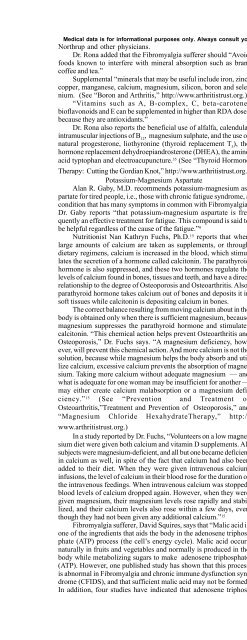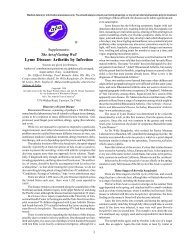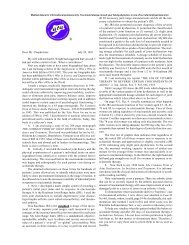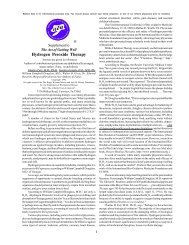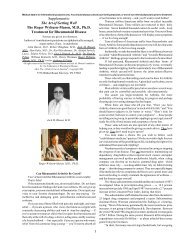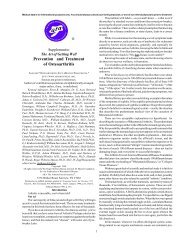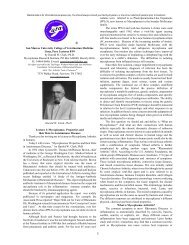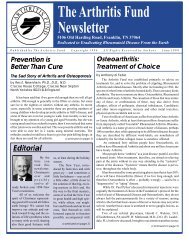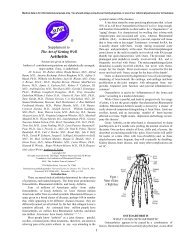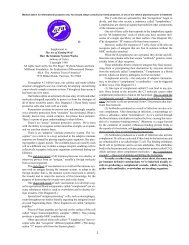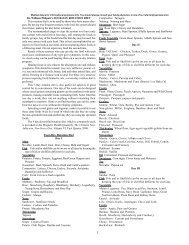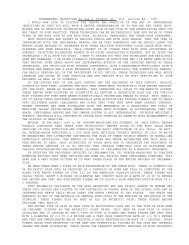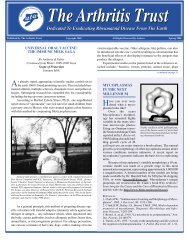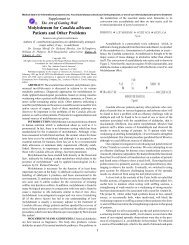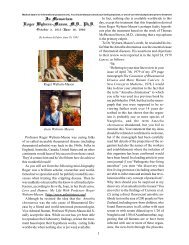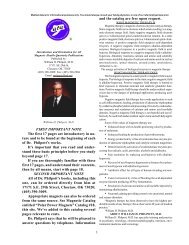Soft Tissue Arthritis Supplement - PDF - Arthritis Trust of America
Soft Tissue Arthritis Supplement - PDF - Arthritis Trust of America
Soft Tissue Arthritis Supplement - PDF - Arthritis Trust of America
Create successful ePaper yourself
Turn your PDF publications into a flip-book with our unique Google optimized e-Paper software.
Medical data is for informational purposes only. Always consult your family physician, or one <strong>of</strong> our referral physicians prior to treatment.<br />
Northrup and other physicians.<br />
Dr. Rona added that the Fibromyalgia sufferer should “Avoid<br />
foods known to interfere with mineral absorption such as bran,<br />
c<strong>of</strong>fee and tea.”<br />
<strong>Supplement</strong>al “minerals that may be useful include iron, zinc,<br />
copper, manganese, calcium, magnesium, silicon, boron and selenium.<br />
(See “Boron and <strong>Arthritis</strong>,” http://www.arthritistrust.org.)<br />
“Vitamins such as A, B-complex, C, beta-carotene,<br />
bi<strong>of</strong>lavonoids and E can be supplemented in higher than RDA doses<br />
because they are antioxidants.”<br />
Dr. Rona also reports the beneficial use <strong>of</strong> alfalfa, calendula,<br />
intramuscular injections <strong>of</strong> B , magnesium sulphate, and the use <strong>of</strong><br />
12<br />
natural progesterone, liothyronine (thyroid replacement T ), the 3<br />
hormone replacement dehydroepiandrosterone (DHEA), the amino<br />
acid typtophan and electroacupuncture. 35 (See “Thyroid Hormone<br />
Therapy: Cutting the Gordian Knot,” http://www.arthritistrust.org.)<br />
Potassium-Magnesium Aspartate<br />
Alan R. Gaby, M.D. recommends potassium-magnesium aspartate<br />
for tired people, i.e., those with chronic fatigue syndrome, a<br />
condition that has many symptoms in common with Fibromyalgia.<br />
Dr. Gaby reports “that potassium-magnesium aspartate is frequently<br />
an effective treatment for fatigue. This compound is said to<br />
be helpful regardless <strong>of</strong> the cause <strong>of</strong> the fatigue.” 9<br />
Nutritionist Nan Kathryn Fuchs, Ph.D. 15 reports that when<br />
large amounts <strong>of</strong> calcium are taken as supplements, or through<br />
dietary regimens, calcium is increased in the blood, which stimulates<br />
the secretion <strong>of</strong> a hormone called calcitonin. The parathyroid<br />
hormone is also suppressed, and these two hormones regulate the<br />
levels <strong>of</strong> calcium found in bones, tissues and teeth, and have a direct<br />
relationship to the degree <strong>of</strong> Osteoporosis and Osteoarthritis. Also,<br />
parathyroid hormone takes calcium out <strong>of</strong> bones and deposits it in<br />
s<strong>of</strong>t tissues while calcitonin is depositing calcium in bones.<br />
The correct balance resulting from moving calcium about in the<br />
body is obtained only when there is sufficient magnesium, because<br />
magnesium suppresses the parathyroid hormone and stimulates<br />
calcitonin. “This chemical action helps prevent Osteoarthritis and<br />
Osteoporosis,” Dr. Fuchs says. “A magnesium deficiency, however,<br />
will prevent this chemical action. And more calcium is not the<br />
solution, because while magnesium helps the body absorb and utilize<br />
calcium, excessive calcium prevents the absorption <strong>of</strong> magnesium.<br />
Taking more calcium without adequate magnesium — and<br />
what is adequate for one woman may be insufficient for another —<br />
may either create calcium malabsorption or a magnesium defi-<br />
ciency.” 15<br />
(See “Prevention and Treatment <strong>of</strong><br />
Osteoarthritis,”Treatment and Prevention <strong>of</strong> Osteoporosis,” and<br />
“Magnesium Chloride HexahydrateTherapy,” http://<br />
www.arthritistrust.org.)<br />
In a study reported by Dr. Fuchs, “Volunteers on a low magnesium<br />
diet were given both calcium and vitamin D supplements. All<br />
subjects were magnesium-deficient, and all but one became deficient<br />
in calcium as well, in spite <strong>of</strong> the fact that calcium had also been<br />
added to their diet. When they were given intravenous calcium<br />
infusions, the level <strong>of</strong> calcium in their blood rose for the duration <strong>of</strong><br />
the intravenous feedings. When intravenous calcium was stopped,<br />
blood levels <strong>of</strong> calcium dropped again. However, when they were<br />
given magnesium, their magnesium levels rose rapidly and stabilized,<br />
and their calcium levels also rose within a few days, even<br />
though they had not been given any additional calcium.” 15<br />
Fibromyalgia sufferer, David Squires, says that “Malic acid is<br />
one <strong>of</strong> the ingredients that aids the body in the adenosene triphosphate<br />
(ATP) process (the cell’s energy cycle). Malic acid occurs<br />
naturally in fruits and vegetables and normally is produced in the<br />
body while metabolizing sugars to make adenosene triphosphate<br />
(ATP). However, one published study has shown that this process<br />
is abnormal in Fibromyalgia and chronic immune dysfunction syndrome<br />
(CFIDS), and that sufficient malic acid may not be formed.<br />
In addition, four studies have indicated that adenosene triphos-<br />
10<br />
phate (ATP) is lower than normal in these syndromes. The adenosene<br />
triphosphate (ATP) process is magnesium dependent.” 24 To Your<br />
Health, Inc., founded by David Squires and his family, therefore<br />
recommends magnesium glycinate, which, he says, “is easy to digest<br />
and readily absorbed into the blood stream.” Other ingredients<br />
included in their Fibro-Care TM are manganese which complements<br />
the blend by stimulating the production <strong>of</strong> thyroxin, a hormone that<br />
influences the ceullar metabolic rate; two B vitamins, thiamine B 1<br />
and pyridoxine B 6 which work closely with magnesium in the<br />
energy production process. Deficiency in thiamine metabolism,<br />
Squires reports, “has been found by one group <strong>of</strong> investigators to<br />
be abnormal.” (See David Squires. “Fibromyalgia — David’s Story,”<br />
A Resource Catalog, To Your Health, Inc., 11809 Nightingale Circle,<br />
Fountain Hills, Arizona 85268.)<br />
Magnesium and Malic Acid<br />
Guy E. Abraham, M.D. and Jorge D. Flechas, M.D., M.PH. 33<br />
in an open clinical setting gave 15 patients ages 32-60 oral preparations<br />
<strong>of</strong> Super Malic ® from Optimax Corporation, Torrance, CA,<br />
containing 50 mg <strong>of</strong> magnesium hydroxide and 200 mg <strong>of</strong> malic acid<br />
per tablet. A total daily dosage <strong>of</strong> 300-600 mg <strong>of</strong> magnesium and<br />
1200-1400 <strong>of</strong> malic acid was administered.<br />
Assessed by the use <strong>of</strong> a Tender Point Index (TPI), an <strong>America</strong>n<br />
College <strong>of</strong> Rheumatology 1990 criteria, all patients reported<br />
significant improvement within 48 hours <strong>of</strong> starting the treatment.<br />
After 6 weeks, 6 patients were switched to a placebo tablet for<br />
2 weeks. Recurrence <strong>of</strong> Fibromyalgia occurred within 48 hours in all<br />
patients who, unknowingly, were on the placebos.<br />
Magnesium Chloride HexahydrateTherapy<br />
According to Raul Vergini, M.D., 14 Predappio, Italy, back in<br />
1915, a French surgeon, Pr<strong>of</strong>. Pierre Delbet, M.D., was looking for<br />
a solution to cleanse wounds, because he had found out that the<br />
traditional antiseptic solutions actually mortified tissues and facilitated<br />
the infection instead <strong>of</strong> preventing it.<br />
He tested several mineral solutions and discovered that a magnesium<br />
chloride solution was not only harmless for tissues, but it<br />
had also a great effect over leucocytic (blood cell) activity and<br />
phagocytosis; so it was perfect for external wounds treatment.<br />
Phagocytosis is the engulfing and perhaps the destroying <strong>of</strong> bacteria<br />
and other foreign bodies.<br />
Dr. Delbet performed a lot <strong>of</strong> “in vitro” [in test tube] and “in<br />
vivo” [in life] experiments with this solution and he became aware<br />
that it was good not only for external applications, but it was also a<br />
powerful immuno-stimulant if taken by injections or even by mouth.<br />
He called this effect “cytophilaxis.” In some “in vivo” experiments<br />
it was able to increase phagocytosis rate up to 300%.<br />
Dr. Delbet serendipitously discovered that this oral solution<br />
had also a tonic effect in many people and so became aware that the<br />
magnesium chloride had an effect on the whole organism.<br />
In a brief time, he received communications <strong>of</strong> very good therapeutic<br />
effects <strong>of</strong> this “therapy” from people that were taking magnesium<br />
chloride for its tonic properties and who were suffering<br />
from various ailments. Pr<strong>of</strong>. Delbet began to closely study the<br />
subject and verified that the magnesium chloride solution was a<br />
very good therapy for a long list <strong>of</strong> diseases.<br />
He obtained very good results in: inflammation <strong>of</strong> the colon<br />
(colitis), biliary vessels (angiocholitis), gall bladder (cholecystitis),<br />
in the digestive apparatus; Parkinson’s Disease, senile tremors and<br />
muscular cramps, in the nervous system, acne, eczema, psoriasis,<br />
warts, itch <strong>of</strong> various origins and chilblains, in the skin. There was<br />
a strengthening <strong>of</strong> hair and nails, a good effect on diseases typical <strong>of</strong><br />
the aged (impotency, prostatic hypertrophy, cerebral and circulatory<br />
troubles) and on diseases <strong>of</strong> allergic orgin (hay-fever, asthma,<br />
urticaria, and anaphylactic reactions).<br />
Then Pr<strong>of</strong>. Delbet began to investigate the relationship between<br />
magnesium and cancer. After a lot <strong>of</strong> clinical and experimental<br />
studies, he found that magnesium chloride had a very good effect on<br />
prevention <strong>of</strong> cancer and that it was able to cure several precancerous<br />
conditions: leucoplasia, hyperkeratosis, chronic mastitis, etc.


